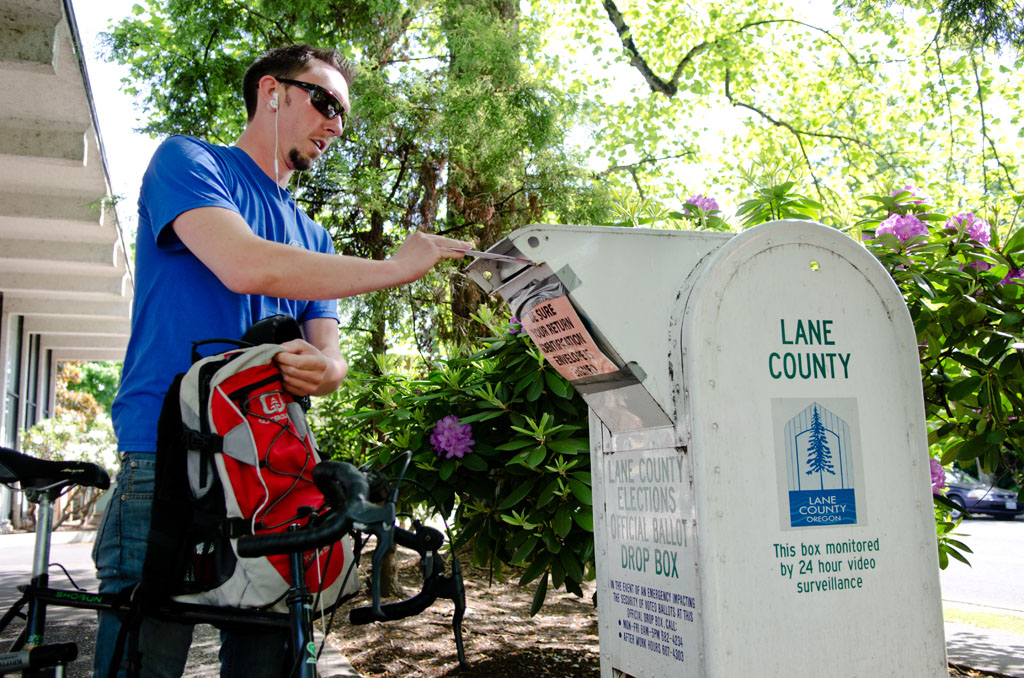
Student-led News21 publishes comprehensive voting rights analysis
Jason Randall, 26, places his mail-in ballot in a drop box outside the Lane County Elections Office in Eugene, Ore. Photo Credit: Michael Ciaglo/News21
A national, student-led investigative reporting project launched this week with an in depth look at voting rights across the country. Among its major findings: in-person voter impersonation on Election Day – which in part drove state legislatures to enact tougher, controversial voter I.D. laws – is virtually non-existent.
“Who Can Vote?” is the 2012 project of News21, a program designed to produce in-depth, innovative and interactive investigative journalism on issues of national importance. The site, which went live over the weekend, includes more than 20 reports, interactive databases, data visualizations and more. The program is headquartered at the Walter Cronkite School of Journalism and Mass Communication at Arizona State University. Two dozen students from 11 universities conducted the research, reporting and writing under the direction of journalism professionals, which included investigating all reported cases of election fraud in the U.S. since 2000. Major media partners have already started to publish parts of their research. The Washington Post highlighted the findings Sunday in an article, “Election Day impersonation, an impetus for voter ID laws, a rarity, data show.” The article cites the research methods:
“The News21 report is based on a national public-records search in which reporters sent thousands of requests to elections officers in all 50 states, asking for every case of alleged fraudulent activity — including registration fraud; absentee-ballot fraud; vote buying; false election counts; campaign fraud; the casting of ballots by ineligible voters, such as felons and non-citizens; double voting; and voter impersonation.”
The Washington Post plans to follow the article with two additional stories this week, as well as post stories to its wire service and website. The Philadelphia Inquirer ran an article “Polls find support for voter ID but little awareness,” citing News21 research which found only 10 cases of alleged in-person voter impersonation since 2000. Msnbc.com is also publishing News21 content. The 2012 News21 project began in January when Leonard Downie Jr., the former executive editor of The Washington Post and a journalism professor at the Cronkite School, conducted a video-conferenced seminar on voting rights. News 21 fellows then traveled to more than 40 cities in 21 states to conduct more than 1,000 interviews and review nearly 5,000 documents.
About this year’s students, Kristin Gilger, the associate dean of the Cronkite School said:
“The voting rights project was an amazing effort involving 24 students who came together from universities all over the country to produce a project of national importance on a subject that couldn’t be more timely. We’re very proud of the work they have done.”
News 21 was recently cited by Knight’s senior adviser to the President, Eric Newton, in an open letter to universities encouraging them to innovate when it comes to teaching journalism education, and to use the “teaching hospital model” that News21 employs. News21 is funded by Carnegie Corporation and Knight Foundation. The Ethics and Excellence in Journalism Foundation provided a grant to support the work of six of the students and the Hearst Foundations supported another three fellows. Last year’s News21 program produced an in-depth investigation into food safety issues in America, including how tainted seafood reaches U.S. households. Knight profiled several of the students who worked on the project to learn how it prepares the next generation of journalists. News 21 is now open to students from any accredited journalism school in the U.S.
By Elizabeth R. Miller, communications associate at Knight Foundation
Recent Content
-
Journalismarticle ·
-
Journalismarticle ·
-
Journalismarticle ·


